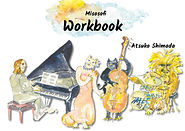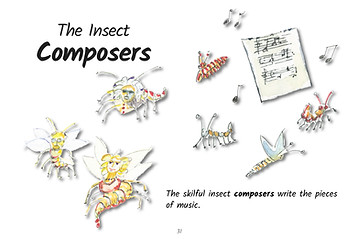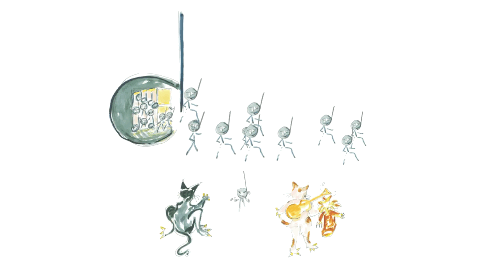Misosofi Method

Features of the Misosofi Perfect Pitch method
POINT 1. Audio book style with picture book
Children develop perfect pitch by listening to audio with a fun story and illustrations by a famous painter in a picture book. It is easy to get interested and familiar with music by using the picture book. In addition, you can use the picture book for storytelling, and also you can use the audio alone for listening to music, depending on the age of the child and the situation they find themselves in.

Oh-oh! The washing machine is broken!
Help-!!!!!
The story goes like this...♪
Matcha fixes it easily with magic.

メガ@マワル*&%^$

Music notes clean themselves in the washing machine.
Yaaaay!!...

Well..
POINT 2. Develop the ears by listening to a lot of music
Many other Perfect Pitch methods focus on just listening to notes and chords. But the Misosofi method is focused on listening to lots of music to educate the ears first, then to train for Perfect Pitch. These audio and playlists are with various genres and eras of music, so everyone can enjoy!





POINT 3. Long term usage
The baby’s ears start hearing when they are a fetus-about 6 months. Therefore the Misosofi method series can be used from fetus age 6 months to between 6-7 years old. After 6-7 years old, books and audios can be used as solfege books (solfege: singing the names of the notes).



.jpg)
.jpg)
.jpg)
POINT 4. Family friendly musical course
We encourage parents also to listen to music with their children. We believe parents will also enjoy the wide variety of music. And when children see their parents enjoying it, they feel happier and enjoy it more.

Ex. from YouTube playlists
POINT 5. Develop all kinds of senses of music
You can develop all kinds of senses of music such as rhythm, pitch, tone, dynamics, tempo and resonation of the melody, along with Perfect Pitch. Learning music from all directions help to get better developing the Perfect Pitch.


POINT 6. Easy to develop into a routine
It is easy to develop into a routine because you can use it during spare time while children are playing or travelling in the car etc. Unlike learning piano or other instruments, parents do not need to set aside a significant time for practice; you can find any spare time like while cooking, cleaning, or eating etc. You can use it as a bedtime story as well.




POINT 7. Faster development in instrumental skills
In the Misosofi method Perfect Pitch series, all musical senses including perfect pitch are compiled into one course meant to be used by fetal aged 6 months up to children aged 6. As a result of mastering these senses at a young age, in the event of the child attending music lessons, more lesson time can be utilized for learning how to play instruments instead of mastering Perfect Pitch and other musical senses.


POINT 8. Develop basic skills in reading sheet music
The child can learn the basis to read sheet music, such as reading notes and understanding symbols by using picture books in the Misosofi method.

Quarter note's house

The staff family
About the Misosofi method Perfect Pitch series
The Misosofi method Perfect Pitch series helps to master Perfect Pitch in a fun and natural way. Develop Perfect Pitch by listening to various music genres along with a fun story in a picture book.
Firstly, listen to various genres of music to start developing Perfect Pitch from fetal age 6 months to 24 months old. Then, around the age of 2, start Perfect Pitch training little by little. Training is just listening and singing! It is simple, so it is easy to keep training without any stress.
For more details, please see the Three Picture-book set.
Age: Fetal age 6 months to 6/7 years old
Listening to music to master Perfect Pitch
The conventional Perfect Pitch training in Japan is the mainstream way to train, which is listening to and guessing chords and notes which means you don’t need to listen to music. However, we think this method takes away from what music really is.
What is the reason to master Perfect Pitch? We believe it helps to better understand music, which in turn enriches your life and makes you happier.
As we mention in this page, training for perfect pitch may help to increase IQ, improve memory and acquire other languages. But these are just additional benefits. We feel that those training methods which don’t include listening to music are only focussed on these outcomes. It is not fun listening to only notes and chords. This is why children lose interest and therefore find it more difficult to master Perfect Pitch. That is why we want children to experience music in a way they can enjoy and that makes their emotions richer as well as stimulating their brain increasing their IQ (intelligence quotient), EQ (emotional intelligence quotient), and SQ (social intelligence quotient).
Also, conventional methods are intensive. But we think that it is ideal to learn naturally rather than by cramming, especially when children are still small. In the Misosofi method, by the age of 2 children have already absorbed the ability they need and therefore do not need to study intensively.
Music in this method covers and consists of all kinds of eras and genres. We carefully selected high quality music from various genres such as classic, jazz, R&B, pop and flamenco. Music has a history and has always reflected historical backgrounds. At the same time, new music can be inspired from old music and develops from old songs. Also, instruments develop with time, so the timbre may change.
It is also interesting to listen to music over time. Compositions which were first played 200 years ago by musicians we have never met are still repeated and handed down because we can empathise with them as a human beings although the way of living is different for us modern people.
Reasons for listening to a variety of music
Why is it important to listen to music?
As children get older they develop stronger likes and dislikes. Some children might find singing training uncomfortable. When that happens, it is important to focus on listening to music and trying to feel it. It is more likely they will sing when they listen and develop an interest in music.
Children absorb more and more information, like a sponge, about things they are interested in. To master Perfect Pitch, it is a big principle to just listen and be interested in music, and get used to listening to music.
Occasionally there are some children who can master perfect pitch just doing Perfect Pitch training without listening to music at home. But if you are aiming for a high level of Perfect Pitch, and you really wish your children to have a life filled with music, it is important to place emphasis on listening to music from when children are small.

We listen to music composed 100 years ago, which were inspired by compositions from 200 years ago. Isn’t it exciting to think about it?
I hope you develop an interest in music as a result of using this method with your child.

Music and IQ (Intelligence Quotient)
Research has been done on the relationship between music education during their childhood and their IQ. The following is one of many reports.
Prof. Glenn Schellenberg in Toronto University, Canada, presented a research report in 2004 as follows. This is an extract of a part from it.
“The idea that music makes you smarter has received considerable attention from scholars and the media. The present report is the first to test this hypothesis directly with random assignment of a large sample of children (N=144) to two different types of music lessons (keyboard or voice) or to control groups that received drama lessons or no lessons. IQ was measured before and after the lessons. Compared with children in the control groups, children in the music groups exhibited greater increases in full-scale IQ.”
E. Glenn Schellenberg (2004) "MUSIC LESSONS ENHANCE IQ" Psychological Science, 15 (8), 511-4
I often hear “Understanding and learning ability have improved since my child started to learning piano” from parents of my students. I realized music helps brain development, which leads to the improvement of IQ.
Music and EQ (Emotional Intelligence Quotient)
EQ (Emotional Intelligence Quotient) has recently been recognised more and defined as the ability to perceive, use, understand, manage, and handle emotions. Reports show that music education helps to improve EQ. To listen or play music, you need a sense of empathy to understand the feeling of the composer and the performer.
In “The Power of Music” by Professor Susan Hallam, London University, England, many reports have been made about the incredible effects music can have. This is an extract from a part of her book.
“There is some evidence for the development of increased empathy in children through musical participation. Hietolahtiansten and Kalliopuska (1990) surveyed 12 year old children who had been musically active for about six years and same-age control children with no musical activity and found that the musically trained children scored significantly higher on scores of empathy. "
Susan Hallam (2014) The Power of Music: A Research Synthesis of the Impact of Actively Making Music on the Intellectual, Social and Personal Development of Children and Young people. London: iMERC
When you play with someone in an orchestra or band, you need to share a musical interpretation of each other and learn how to play together. You will need flexibility to understand and respect others, and control your own feelings. I think you can improve your EQ ability naturally while you learn music.
Music and SQ (Social Intelligence Quotient)
SQ (Social Intelligence Quotient) has also been recognised more recently, much like EQ; it is also known as social cognition or social marketing intelligence. It focusses on interpersonal skills and sociability. It is the ability to understand other’s feelings, act in consideration of others, and smoothen interpersonal relations.
This is an extract of the thesis by Dr. David Gerry, Hamilton University, Canada, in 2012.
“Infants assigned to the active musical experience showed superior development of prelinguistic communicative gestures and social behaviour compared to infants assigned to the passive musical experience. These results indicate that (1) infants can engage in meaningful musical training when appropriate pedagogical approaches are used, (2) active musical participation in infancy enhances culture-specific musical acquisition, and (3) active musical participation in infancy impacts social and communication development.”
Gerry, Andrea Unrau, Laurel J. Trainor (2012) Active music classes in infancy enhance musical, communicative and social development. Developmental Science, 15 (3), 398-407
There is a theory that the elements of music such as rhythm and sound were originally used to communicate with others before language developed. For example, to let others know that an enemy is coming by clapping hands in the same rhythm. If the origin of music was to communicate with others, I think music is the best way to improve SQ.

Music and language
Listening to large quantities of music stimulates the ears and brain. To listen and learn music and master perfect pitch might help to improve brain development and language ability.
This is an extract from the paper of Dr. Nadine Gaab in Stanford University, USA.
“Our results suggest that musical training alters the functional anatomy of rapid spectrotemporal processing, resulting in improved behavioral performance along with a more efficient functional network primarily involving traditional language regions. This finding may have important implications for improving language/reading skills, especially in children struggling with dyslexia.”
N. GAAB, P. TALLAL, H. KIM, K. LAKSHMINARAYANAN, JJ ARCHIE, GH GLOVER, JDE GABRIELIa (2005) Correlates of Rapid Spectrotemporal Processing in Musicians and Nonmusicians, Ann. NY Acad. Sci. 1060, 82–88
We often hear about a relationship between music and the brain, and that learning music from a young age might positively affect your brain. Also, we often hear “you are good at catching words” or “you have good ears” when a person who has been learning music since a young age attempts to learn a foreign language. Listening and learning music has a good effect on the ears and brain, and as a result it may help with learning languages. It is also fascinating to note that listening to and learning music may have a positive effect on dyslexic people. I have a student who is dyslexic and practiced the violin as a child and scored full marks on a music theory test and I believe his understanding of music is at the same level as children without dyslexia. From experiences like that I now believe that music has a great effect on us.
